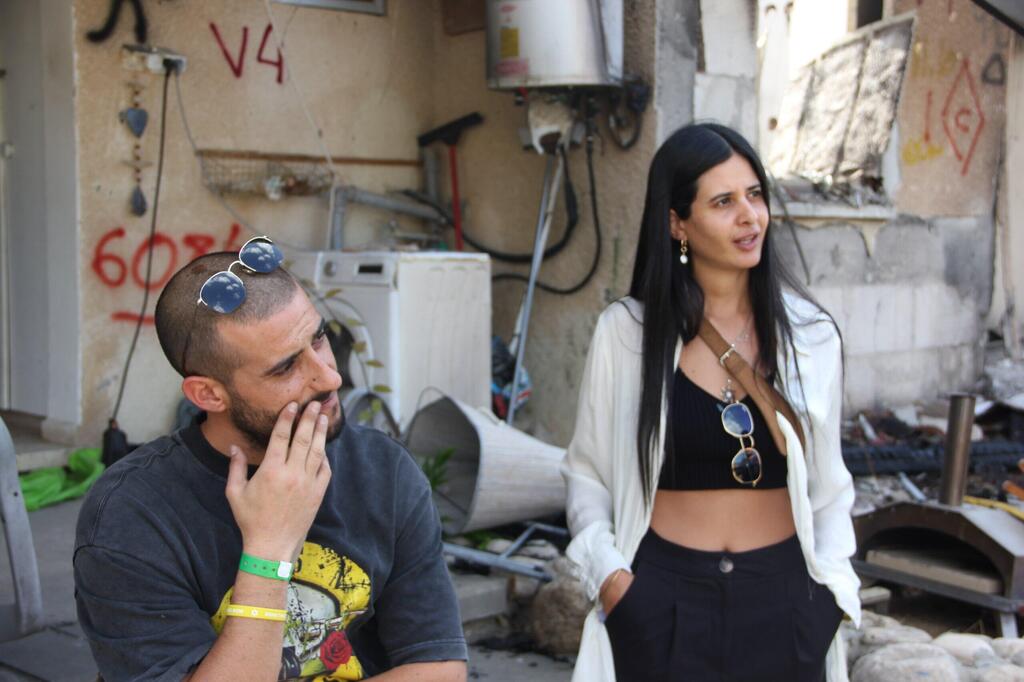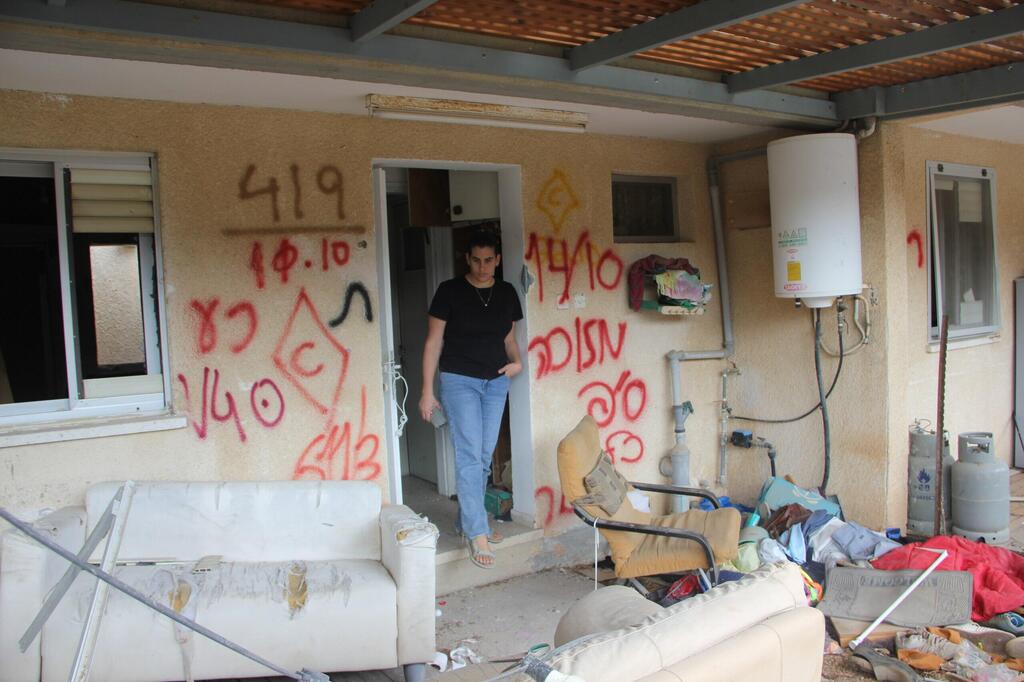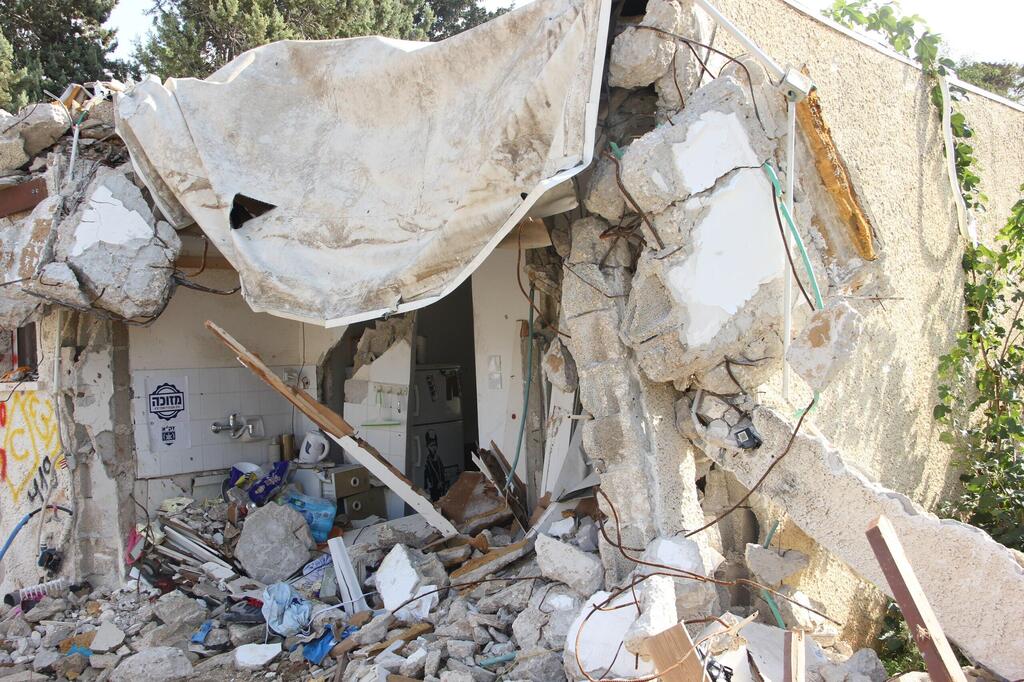Getting your Trinity Audio player ready...
It's hard to envision an adult fitting into this narrow closet, barely 16 inches wide. Yet, this was the hiding place of Adv. Amit Sosna when terrorists invaded Kibbutz Kfar Aza. While concealed here, she sent her final message: "It sounds like they're outside, I wish this was over. I'm hiding in the closet, this is the most terrifying thing ever, more gunfire, my battery's running low."
Read more:
From her small apartment in the Hador Hatzair neighborhood, she was abducted into Gaza. Now, the apartment is entirely charred, the safe room blackened and the air still heavy with the aftermath of tragedy. Despite the damage, the closet endured the fire, standing as a haunting reminder of the terror.
Hadar Haniya and Nadav Alon stand outside the door of the neighboring apartment. This is their first visit since that fateful Saturday. They had been holed up in their safe room, which also serves as their bedroom, for almost a full day. They were without water, food, and at some point, even electricity and phone batteries. They were the only survivors in their block, as all others had been either kidnapped or killed. Hadar gestures towards the nearby apartments, naming the friends and neighbors who are no longer here, either temporarily due to being abducted, or for good, regarding those who did not survive the massacre.
About a year ago, they relocated here from Moshav Mavki'im. Hadar, originally from Moshav Pe'at Sade in Gush Katif, was just 11 when Israel withdrew from Gaza. Since then, she's lived a secular life. However, on October 7, when it dawned on them that no rescue was forthcoming, she sought solace in faith. "It's been a while since I prayed," she admits, "so I tried to recall the prayers from the retreat."
"Towards midday, the house was invaded by terrorists," Nadav recalls. "Their shouts of 'Allahu Akbar' and 'Yalla Palestine' filled the air." He recounts how they attempted to force open the safe room, and how he held onto the handle with all his might, until they eventually gave up and moved on.
How did you keep each other calm?
Hadar: "I sang to him."
"I yelled 'We're citizens! Don't shoot"
By half past five on Sunday morning, they heard the IDF forces and resolved to exit the house. Hadar recounts, "A Duvdevan Special Forces jeep was parked nearby. We approached the driver and he instructed us to climb in from the back."
3 View gallery


'Their shouts of Allahu Akbar and Yalla Palestine filled the air'
(Photo: Dr. Baruch Zimmerman)
Nadav recalls, "There I was, shirtless, wearing flip flops, and wielding a gun. My appearance was a bit disheveled, unshaven. As I was climbing into the jeep, with half my body already inside, the soldiers noticed my gun. Suddenly, shouts of 'Terrorist! Terrorist!' filled the air. They had mistaken me for a terrorist. One soldier on the jeep reacted by kicking me in the chest. Simultaneously, another soldier fired a shot at me. But due to his comrade's kick, the bullet hit him in the leg instead of me. If he hadn't pushed me, I would have been the one shot."
Hadar: "Then I yelled 'We're citizens! Don't shoot!'"
Nadav: "It's understandable. They were hours into the fighting and terrorists were still in the Kibbutz, and there I am, showing up with a gun."
"It's the smell of abandonment"
The area between the blocks bears the scars of that tragic Saturday. Nadav's bullets pierced a mobile gas mechanism, which miraculously did not detonate. A battered safe room door, charred with soot and adorned with faded stickers of Disney princesses, is a haunting reminder. We encounter Lizzie Edri, the sister of the late Aviad, at the entrance of his apartment.
"We were on a call from 6:30 in the morning," she recalls. "He climbed to the roof and spotted terrorists breaking in through the back gate. Initially, he confused them with the police. Once he identified them as terrorists, he sought refuge in his safe room. Unfortunately, the door wouldn't secure, so he dashed to Alon Shamriz's safe room in a nearby apartment. But the AK-47 bullets managed to penetrate even that door," she indicates the bullet holes.
This is her third time here. "The first time there was still the smell of corpses. It's the smell of abandonment. The smell of fear. I come here to get answers."
"What are the questions?" wonders reservist Baruch Zimmerman, PhD in biology and tour guide in his civilian life.
Lizzie: "I'm trying to understand where and how he was killed. I discovered bloodstains in the safe room, but his phone was located outside the house. Could he have been fighting in his final moments? Was he set aflame? Knowing these details matters to me. Nira Shefek, a former Knesset member and resident of Kfar Gaza, has been assisting me in gathering information."




